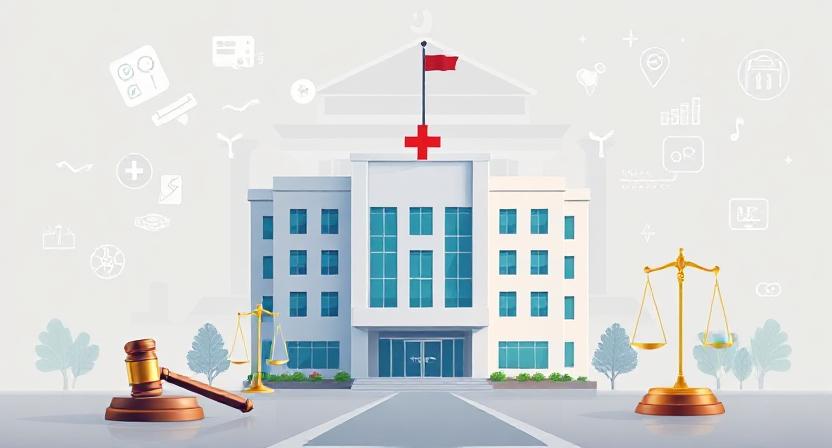Emerging Legal Challenges in India’s Health Sector: A 2025 Legal Outlook
Introduction
India’s health sector is undergoing significant transformation. From the rise of digital healthcare platforms to enhanced public health regulations post-COVID, the legal landscape is shifting rapidly. The emerging legal challenges are no longer limited to traditional issues like medical negligence but have expanded into data privacy, telemedicine compliance, insurance disputes, and health infrastructure regulations.
This blog unpacks the latest legal developments, bare act provisions, case laws, and strategic considerations for healthcare professionals, institutions, and legal advisors.
1. Legislative Framework Governing Health Laws in India
India does not have a single unified health law. Instead, it operates under a web of laws at central and state levels. Key enactments include:
1.1. Clinical Establishments (Registration and Regulation) Act, 2010
Section 3 of the Act mandates all clinical establishments to be registered as per prescribed standards.
Bare Act Extract:
“No person shall run a clinical establishment unless it has been duly registered under this Act.”
Explanation: This ensures minimum standardization and patient safety across clinics and hospitals. Many private establishments have faced penalties and temporary closures for non-compliance.
Challenge: Several states have still not adopted the Act, creating a non-uniform regulatory environment.
1.2. Drugs and Cosmetics Act, 1940
The regulatory backbone for pharmaceuticals, this Act governs drug manufacture, distribution, and sale.
- Section 18 prohibits the manufacture and sale of misbranded, adulterated or spurious drugs.
- Section 27 prescribes penalties ranging from fines to life imprisonment for certain offences.
Example: In 2023, a leading pharma company was fined ₹25 crore for selling substandard COVID medicines in Maharashtra.
1.3. Telemedicine Practice Guidelines, 2020 (Under Indian Medical Council Act)
Post-pandemic, telemedicine has become a norm, but legal compliance remains an issue.
- Clause 3.7 mandates patient consent (explicit or implied) before consultations.
- Clause 3.9 prohibits prescribing Schedule X drugs without physical examination.
Legal Risk: Tele-consultations without proper consent or prescribing controlled drugs online can lead to disciplinary actions under the National Medical Commission (NMC) Act, 2019.
1.4. Digital Personal Data Protection Act, 2023
For healthcare entities handling patient data, this Act is critically important.
Section 4(2):
“Personal data shall be processed only for lawful purposes for which the data principal has given consent.”
Application to Health Sector:
- Hospitals must ensure informed data consent from patients.
- Use of data for research, insurance, or third-party apps without consent is punishable.
Penalties: As per Section 33, fines can go up to ₹250 crore for violations involving sensitive health data.
2. Public Health Policies and Challenges
2.1. National Health Policy, 2017 – Legal Impact
While not a statute, this policy provides the vision for future health laws.
- Advocates for legal recognition of mental health, palliative care, and universal health insurance.
- Leads to policy-driven litigation on state obligations to provide affordable care (e.g., free dialysis schemes).
Challenge: Implementation lags due to fiscal and administrative issues.
2.2. Mental Healthcare Act, 2017
Section 21(1):
“Every person with mental illness shall have the right to access mental healthcare services run or funded by the government.”
Legal Concern: Many patients are unaware of this statutory right, leading to litigation in High Courts for access to mental health beds or treatment reimbursement.
3. Legal Issues in Healthcare Delivery
3.1. Medical Negligence
Guided by Jacob Mathew v. State of Punjab (2005) 6 SCC 1, the SC held that negligence requires “gross incompetence or recklessness.”
With rising malpractice cases, legal advisors must prepare:
- Defensive documentation protocols
- Consent forms
- Standard treatment guidelines adherence
3.2. Insurance Disputes
Hospitals face regular claim rejections from insurance companies, leading to litigation under the Consumer Protection Act, 2019.
Case:
In Max Hospital v. Policyholder (2023), NCDRC upheld compensation of ₹3 lakh for unjust denial of cashless insurance during emergency care.
4. Corporate Compliance in Health Sector
Hospitals and pharma companies must comply with:
- The Companies Act, 2013 (CSR provisions under Section 135 for health projects)
- FCRA Regulations – for NGOs in healthcare receiving foreign funding
- Environment Protection Act, 1986 – for biomedical waste handling
- Legal Metrology Act, 2009 – for packaging of health products
5. Future Trends and Legal Preparedness
- AI in Diagnosis: Will attract new liabilities under product liability and data protection laws.
- Healthcare Startups: Need to navigate telemedicine, IT Act, and consumer law simultaneously.
- Ayushman Bharat Digital Mission: Will create a national health stack, raising data sovereignty and access issues.
6. Remedies for Non-compliance
If a healthcare provider is charged under any of the above laws:
Step 1: Immediate Legal Representation
Retain legal counsel specialized in healthcare law or medical defense.
Step 2: Regulatory Response
Engage with authorities such as:
- NMC for doctor-related issues
- CDSCO for drug-related compliance
- State Health Authority for clinic/hospital matters
Step 3: Appeal Mechanisms
- File appeals before Medical Tribunals, Consumer Courts, or High Courts depending on the issue.
Step 4: Compliance Rectification
Make necessary corrections (e.g., infrastructure upgrades, data audits) and submit compliance reports.
Conclusion
The Indian health sector is moving toward a more regulatory-heavy and compliance-driven framework. While this strengthens patient rights, it poses significant legal risks and challenges for providers. A proactive legal strategy, regular compliance audits, and awareness of emerging laws are crucial to navigating this evolving landscape.
📞 Need Legal Help in Health Sector Compliance or Litigation?
ProLegalMinds provides expert legal counsel for hospitals, health-tech startups, pharma companies, doctors, and patients.
🌐 Website: https://prolegalminds.com/
📅 Book a Meeting: https://meetings.hubspot.com/shiva20
📱 WhatsApp: +91 94940 51717
📞 Call: +91 94940 51717
🔗 LinkedIn: ProLegalMinds
Would you like a matching LinkedIn post, image prompt, or emailer version of this blog?

